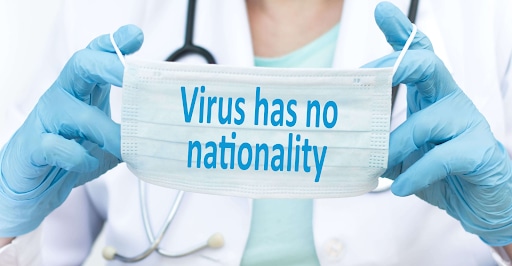With the coronavirus pandemic wreaking havoc across the globe, businesses large and small are scrambling to ensure the safety of their employees. Many companies have implemented remote work policies or staggered shifts to keep workers safe. However, some employers are exhibiting unlawful discriminatory practices to terminate an employee or prevent them from working based on speculation that the employee’s race, national origin, or disability indicates possible exposure to coronavirus. These prohibited practices are laid out in the Americans with Disabilities Act (ADA). The disabilities act makes clear both protections and penalties for discriminatory practices.
The National Institute on Minority Health and Health Disparities study found that U.S. minorities experience high rates of COVID-related discrimination. The Asian community has reported the most incidents of racial taunts, insults, threats, name-calling, and even physical harassment during the pandemic.
With the debate raging on whether to require vaccination against COVID-19, many people are concerned about being discriminated against for not agreeing to be vaccinated. Several employers have laid-off workers or placed them on unpaid leave for refusing vaccination. Some companies demand that unvaccinated employees take additional safety precautions and submit to weekly tests.
If you believe your employer is unlawfully discriminating against you, it is essential that you contact a lawyer as soon as possible. You should seek legal counsel immediately if you feel your rights are being violated.

What Are Your Rights Concerning COVID-19?
Employees who feel discriminated against for reasons related to the coronavirus can file complaints with the Equal Employment Opportunity Commission (EEOC). The agency will investigate claims of workplace discrimination and determine if the employer violated federal law. Besides filing an EEOC complaint, affected individuals may seek legal recourse through private lawsuits.
An impairment resulting from COVID-19 may qualify as a disability for employees or job applicants. You may be also protected against medical condition discrimination by the federal Americans with Disabilities Act (ADA).
The New York State Human Rights Law (HRL) protects individuals from employment discrimination based on various personal characteristics, including race, national origin, disability, and medical conditions. The HRL prohibits employment decisions such as hiring, firing, compensation, promotions, training, and other terms and conditions of employment based on these protected factors.
- If you are a guest of a hotel, restaurant, transport service, or retail store, they cannot prevent you from entering or accessing goods or services because they believe you may be exposed to coronavirus because of national origin or race.
- If your employer believes you may have been exposed to the coronavirus due to your race, national origin, perceived medical condition, or disability, they cannot fire you, send you home, or forbid you to work.
- If you are wearing a face mask as a precaution, you are still protected against discrimination.
- If you have been harassed or threatened because someone thinks you have the coronavirus, contact law enforcement to report the incident immediately.
The Equal Employment Opportunity Commission (EEOC) updates its vaccination guidance periodically. Additionally, the agency points out that federal anti-discrimination laws don’t prohibit employers from requiring employees to receive COVID-19 vaccinations before they physically enter the workplace.
However, employers who require or encourage vaccinations must make reasonable accommodations when employees do not wish to be vaccinated for medical reasons, including pregnancy or other medical conditions, or sincerely held religious beliefs unless that accommodation would cause undue hardship to the business. Employee requests for reasonable accommodation can not be denied. Federal agencies are required to abide by requests for reasonable accommodation by federal employees. In the private sector, private employers are required to also make reasonable accommodations for medical status as described in the disabilities act. Employee requests for reasonable accommodation can include work at home arrangements for people who can not be vaccinated for religious or medical reasons.
If your employer refuses to provide reasonable accommodations, you may have grounds for legal action. Medical discrimination can be a complex issue to navigate. Having a medical discrimination lawyer in your corner should be the very first thing you arrange. We at Levin and Blit can help answer your disability-related inquiries and determine if you have grounds for a case.
Note: Information about coronavirus (COVID-19) is changing rapidly. Visit the NYC Department of Health and Mental Hygiene page for the latest information.
Speak with Our Medical Discrimination Lawyers
If you believe you have been discriminated against over COVID-19 or if your employer is not accommodating your disability, reach out to the employment lawyers at Levine & Blit. You can call 212-967-3000 or contact us via email to set up a Free Case Evaluation. We offer a no-cost initial consultation for all types of medical discrimination cases and workplace harassment cases.
